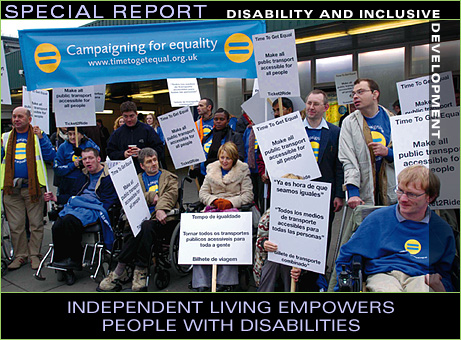Independent Living Empowers People with Disabilities

See also: Sarbib, Jean-Louis. 2005-07. ”Development OUTREACH, July 2005.”
Independent Living is a philosophy, a way of looking at disability and society, and a worldwide movement of disabled people who work for self-determination, self-respect and equal opportunities.
In most countries preconceived notions and a predominantly medical view of disability contribute to negative attitudes towards people with disabilities. Often they are portrayed as sick, defective and deviant persons, as objects of professional intervention, as a burden for themselves and their families, dependent on other people’s charity. These deep-rooted views have consequences for their opportunities in getting education and work or raising families of their own. Everywhere, persons with disabilities make up a large portion of the poor.
With origins in the US civil rights and consumer movement of the late 1960s the Independent Living movement replaces the special education and rehabilitation experts’ concepts of integration, normalization and rehabilitation with a new paradigm developed by disabled people themselves. The first Independent Living ideologists and organizers were people with extensive disabilities. Today the movement’s message is still most easily grasped by people whose everyday lives depend on assistance with the activities of daily living, since they are most exposed to custodial care, paternalistic attitudes and control by professionals.
The Independent Living philosophy postulates that disabled people are the best experts on their needs, must take the initiative, individually and collectively, in designing and promoting better solutions and must organize themselves for political power. Besides de-professionalization and self-representation, the Independent Living ideology comprises de-medicalization of disability, de-institutionalization and cross-disability (i.e. inclusion regardless of diagnoses).
In the Independent Living philosophy, disabled people are primarily seen as citizens and only secondarily as consumers of healthcare, rehabilitation or social services. As citizens in democratic societies they have the same right to participation, to the same range of options, degree of freedom, control and self-determination in every day life and life projects that other citizens take for granted. These demands require the removal of infrastructural, institutional and attitudinal barriers and the adoption of the Universal Design principle. Depending on the individual’s disability, support services such as assistive technology, income supplements or personal assistance might be necessary to achieve equal opportunities. Needs assessment and service delivery must enable users to control their services, to freely choose among competing service providers and to live in dignity in the community. Cash benefits have been found superior to services in-kind in terms of users’ quality of life and cost-efficiency.
The Independent Living approach, in traditional self-help group fashion, is based on peer support and role modeling in local grass-roots initiatives, referred to as Centers for Independent Living or CILs, that are run and controlled by persons with disabilities. The example of a peer, somebody who has been in a similar situation, can be more powerful than non-disabled professionals’ interventions in analyzing one’s situation, in assuming responsibility for one’s life and in developing coping strategies. According to the movement, with peer support all of us—including persons with extensive developmental disabilities—can learn to take more initiative and control over their lives. For example, peer support is used in Independent Living Skills classes where people living with their families or in institutions learn how to run their everyday lives in preparation for living by themselves. Depending on the public services in the community, CILs might assist with housing referral and adaptation, personal assistance referral, or legal aid. Typically, centers work with local and regional governments to improve infrastructure, raise awareness about disability issues and lobby for legislation that promotes equal opportunities and prohibits segregation and discrimination.
Over the years, the movement has spread from North America to all continents adapting itself to and getting enriched by different cultures and economic conditions in the process. A considerable body of research, training materials and examples of good practice exists on such themes as transition from institutional to community living, transition from school to employment or self-employment, community organizing and advocacy, disability culture, girls and women with disabilities as well as disability and development. Supporting the movement and utilizing its work has become an important ingredient of many countries’ social policy.
Independent Living does not mean that we want to do everything by ourselves or that we do not need anybody or like to live in isolation. Independent Living means that we demand the same choices and control in our every-day lives that our non-disabled brothers and sisters, neighbors and friends take for granted. We want to grow up in our families, go to the neighborhood school, use the same bus as our neighbors, work in jobs that are in line with our education and interests, and raise families of our own. We are profoundly ordinary people sharing the same need to feel included, recognized and loved.
Adolf D. Ratzka,
Independent Living Institute, Stockholm

